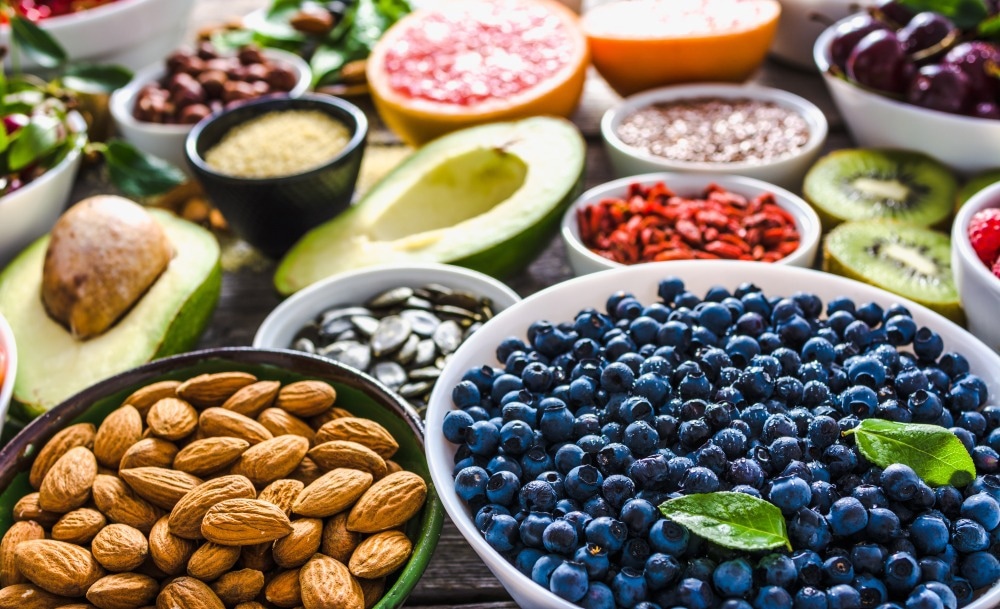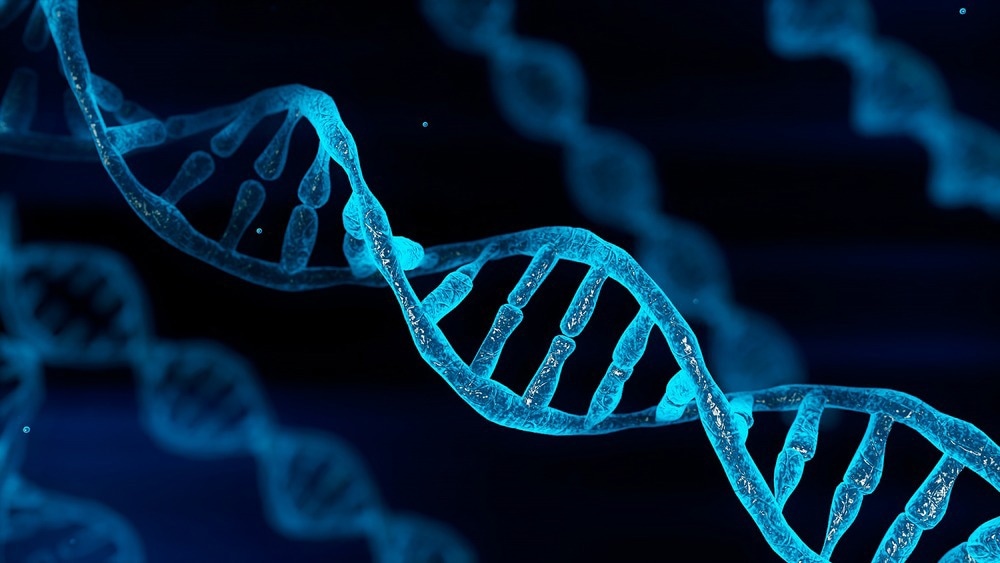The genetic blueprint of nutrition
Personalized diets
Challenges and controversies
From research to reality
References
Further reading
Nutrigenomics or nutritional genomics comprises the study of how genes and nutrition interact, with gene variants predicting how an individual’s body will respond to specific nutrients.1 Gene-diet interactions are a two-way axis and can affect health and disease status in individuals; approaches that determine these interactions at both the cellular and molecular levels can aid in developing nutritional interventions personalized to each person’s genome.2

Image Credit: alicja neumiler/Shutterstock.com
The genetic blueprint of nutrition
Nutrigenomics involves using various scientific fields, including biochemistry, physiology, nutrition, genomics, proteomics, metabolomics, transcriptomics, and epigenomics in order to investigate and understand the bi-directional interactions between different genes and nutrients at the molecular level.2
Identifying these interactions between genes and nutrients can assist with producing prescribed customized diets corresponding to each person’s genotype.3 This comprehension and development of a personalized diet has the potential to mitigate the symptoms of both existing diseases as well as prevent future diseases, especially for non-transmissible chronic diseases (NTCDs), which is a significant world public health problem.3
An example of gene interaction with food can be seen with genes responsible for digestion and absorption of carbohydrates and fats.4 Two gene polymorphisms, rs1042714 and rs1042713, related to the ADRB2 gene that encodes the β2-adrenergic receptor cause a decrease in carbohydrate output rate in cells, and this subsequently can result in the development of disorders including type 2 diabetes mellitus, obesity, and metabolic syndrome.4
Additionally, the gene that encodes the nuclear receptor (gamma receptor) known as PPARG induces the proliferation of peroxisomes; this regulates the transcription of different genes involved in the metabolism of lipids and carbohydrates in muscle tissue and inflammatory processes.4
A portion of the PPARG gene that consists of the oligonucleotide polymorphism, rs1801282, is believed by researchers to increase sensitivity to insulin, total cholesterol, high-density lipoprotein as well as increased glucose utilization, which acts as a protective mechanism against both obesity and diabetes mellitus.4

Image Credit: MiniStocker/Shutterstock.com
Personalized diets
The translation of nutrigenomics can result in a more personalized approach to both diet and health, with diet playing a significant environmental role in health, from benefits including the prevention of diseases to performance and overall quality of life.5
Individuals have been known to have different responses to the same dietary intake. For example, for the past 20 years, dietary cholesterol has been believed to lead to changes in plasma cholesterol; however, this can be dependent on the individual. Additionally, some differences in response to dietary cholesterol are also dependent on genotype. 5
Personalizing the overall diet may not be as simple as personalizing essential nutrient intake, which can be delivered through supplements.5 The goal of personalizing nutrition is dependent on an individual’s genotype and metabolic variations that first require identifying responders and non-responders to personalized diets. 5
The practical implication for creating personalized diets can be difficult, with each person having different needs and responses to the components of a diet; this subject is being actively researched in nutrigenomics in order to identify which difference is a result of heritable genetic sequence variation.5
Challenges and controversies
Dietary health challenges have evolved over the years, from finding solutions for nutrient deficiencies as a result of poor food choices to dealing with caloric imbalances that are caused by poor diets.5 This has changed the food concerns of consumers from fearing acute safety to being afraid of long-term health deterioration.5
Achieving tailor-made diets and personal health will require entire diets to be personalized instead of just occasional foods, which means nutritional needs will have to be integrated into all foods consumed.5
This approach of developing entire diet plans that deliver all meals and foods to an individual every day in order to correspond to their nutritional need may have the unfortunate consequence of destroying the traditional joy that individuals have from the diversity of an open food marketplace. Subsequently, this may not be a sustainable approach for every person.5
However, approaches that combine the ability to match dietary needs while also allowing for personal choice may be more palatable.5 Additionally, the development of diets that are based on metabolic, performance, and cognitive requirements may be the first step into aiding those who choose to eat healthier with food products and devices that already exist on the market to meet consumer demand.5
The ethical considerations of personalized diets led by nutrigenomics, which encapsulate genetic testing in order to gain nutritional advice, include the lack of knowledge of the risks, as it may be difficult to avoid unknown risks.6 The precautionary principle states to exercise caution and avoid actions when risks cannot be foreseen, and personalizing diets based on genotypes is not something that can be stated as being absolutely safe or without risk.6
NUTRIGENOMICS | Dr. Sara Gottfried | TEDxMarin
From research to reality
One of the first dietary intervention studies included the use of proteomics technology in order to identify biomarkers that demonstrate the response of peripheral blood mononuclear cells (PBMCs) to dietary isoflavone extract in postmenopausal women.7
Proteomics in PBMCs was used to identify proteome-diet interactions during the postprandial state after different types of meals, which demonstrated how some meals increased or decreased proteins that respond to oxidative stress and DNA damage.7 This can demonstrate the impact of using approaches to regulate diet in order for more favorable outcomes in individuals with health conditions.7
With various studies being researched, including using metabolomics, due to metabolites being products of dietary intake and metabolism, these analytical tools can evaluate biochemical and physiological pathways of related dietary or disease metabolite biomarkers.7
Interestingly, individuals who are obese or have type 2 diabetes have specific metabolomic signatures dependent on lipid species and amino acids, and identifying these in individuals can aid in personalizing a diet that consists of low-glycemic index foods as opposed to high-glycemic index foods for more favorable health outcomes.7
Overall, nutrigenomics in healthcare may be an innovative approach for preventive medicine and may aid in better management of chronic conditions, including type 2 diabetes and obesity.7
References
- Cleveland Clinic. How nutrigenomics may impact the way you eat. Cleveland Clinic. December 14, 2023. Accessed January 5, 2024. https://health.clevelandclinic.org/how-does-nutrigenomics-work.
- Ahluwalia MK. Nutrigenetics and nutrigenomics—a personalized approach to nutrition. Advances in Genetics. Published online 2021:277-340. doi:10.1016/bs.adgen.2021.08.005
- Sales NM, Pelegrini PB, Goersch MC. Nutrigenomics: Definitions and advances of this new Science. Journal of Nutrition and Metabolism. 2014;2014:1-6. doi:10.1155/2014/202759
- Vesnina A, Prosekov A, Kozlova O, Atuchin V. Genes and eating preferences, their roles in personalized nutrition. Genes. 2020;11(4):357. doi:10.3390/genes11040357
- German JB, Zivkovic AM, Dallas DC, Smilowitz JT. Nutrigenomics and personalized diets: What will they mean for food? Annual Review of Food Science and Technology. 2011;2(1):97-123. doi:10.1146/annurev.food.102308.124147
- Görman U, Mathers JC, Grimaldi KA, Ahlgren J, Nordström K. Do we know enough? A scientific and ethical analysis of the basis for genetic-based personalized nutrition. Genes & Nutrition. 2013;8(4):373-381. doi:10.1007/s12263-013-0338-6
- Brennan L, de Roos B. Nutrigenomics: Lessons learned and future perspectives. The American Journal of Clinical Nutrition. 2021;113(3):503-516. doi:10.1093/ajcn/nqaa366
Further Reading
Last Updated: Jan 24, 2024